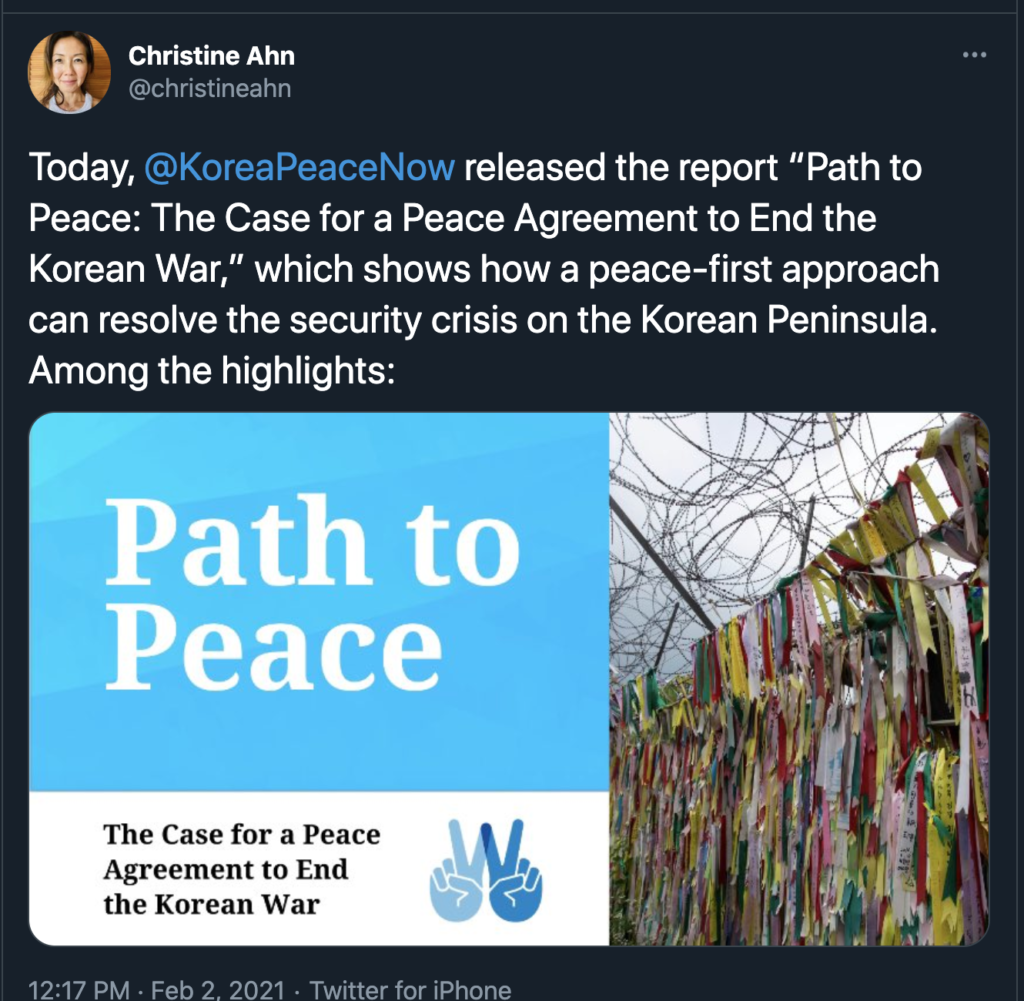While the Biden administration continues to promote its tired mix of sanctions and incentives to force North Korea to disarm, a coalition of women’s peace groups is calling on the US government to try what no American leader has done before: sign a peace treaty that would formally terminate the Korean War, which has never ended despite a shaky armistice signed in 1953.
The report, “Path to Peace: The Case for a Peace Agreement to End the Korean War,” was released February 2 by Korea Peace Now, a global coalition of women’s peace organizations. In it, a group of activists and analysts make the case that a peace agreement would “lower tensions and make room for progress on issues such as improved human rights and denuclearization.”
Key quotes from the report:
A peace agreement including the United States and the two Koreas would bindingly end the state of war, recognizing that wartime rights to use force have ended once and for all. Other commonly proposed instruments, such as end-of-war declarations, nonaggression agreements, or normalization agreements, do not necessarily end a state of war. A peace agreement would reduce the risk of nuclear war and facilitate talks on disarmament or arms control. A peace agreement that ends the wartime status quo and enables the normalization of US–North Korean relations may create the conditions for more effective engagement on denuclearization by curbing the security risks fueling North Korea’s pursuit of nuclear weapons. A peace agreement would not legally imply recognition of North Korea as a “nuclear weapons state.”
The unresolved Korean War has had a negative human rights impact on all parties. Governments have diverted resources toward militarism and away from people’s welfare and have imposed restrictions on civil liberties in the name of security. Pressure has failed to improve human rights. While a peace agreement to resolve the Korean War is not a panacea, it would improve people’s lives, sap the militarism that undergirds abuses, and create the conditions to engage more effectively on human rights. A peace agreement would also improve the national security of South Korea and the United States and create space to recalibrate their relationship in ways that better fit contemporary circumstances and interests. A peace agreement would not legally imply the end of the alliance or a withdrawal of US troops, unless otherwise specified. It would imply dissolution of the Armistice and the “UN Command.”
Women have a particular stake in resolving the Korean War due to the gendered impacts of war and militarism. Despite a rich history of organizing through grassroots action on the Peninsula and internationally, only very few have been invited to formal peacemaking initiatives. Several sources of international law, including the Women, Peace, and Security framework, mandate women’s inclusion. Research shows that such inclusion contributes to more durable peace.

Finally, the report recommends that “the United States, South Korea, and North Korea immediately conclude a fair and binding peace agreement that acts as a final settlement of the war and serves as a foundation for a peace regime.”
In a press release accompanying the report, three women in Congress talk about its significance.
“Korea Peace Now’s new report makes a powerful case for the urgent need to formalize the end of the Korean War,” said Representative Ilhan Omar. “The benefits to human rights, denuclearization, and national security are clear. I look forward to continuing our work together to finally bring the war to a formal end.”
“It is clearer than ever – in the face of a pandemic, global recession, and worsening security crisis on the Korean Peninsula – we need a fair, binding, and peaceful resolution to the Korean War now,” said Congresswoman Jan Schakowsky. “And as Korea Peace Now! finds in their comprehensive report, when women influence peace processes, the resulting peace is more likely to last. The global community must demand that women are meaningfully included at all levels of the Korea peace process to ensure that any final agreement is sustainable.”
“It’s long past time for Congress to formally end the Korean War,” said Congresswoman Barbara Lee. “Keeping this conflict on a hair trigger has left diplomatic efforts vulnerable to mistrust and miscalculation. This report outlines how a negotiated agreement can reduce the risk of war, and allow Koreans and Americans to build a more peaceful and prosperous future. I will keep working in Congress with allies like Women Cross DMZ to make that a reality.”
The authors of the report will hold a press conference tonight at 6 pm EST (8 am KST February 3rd).
Pulitzer Prize winning-reporter Charles Hanley (recent author of GHOST FLAMES: Life & Death in a Hidden War) will join the call as moderator. Speakers include:
? Christine Ahn, Executive Director, Women Cross DMZ
? Henri Féron, Senior Fellow, Center for International Policy
? Catherine Killough, Advocacy and Leadership Coordinator, Women Cross
DMZ
? Hyun Lee, U.S. National Organizer, Women Cross DMZ
? Youngmi Cho, Executive Director, Korean Women’s Movement for Peace

